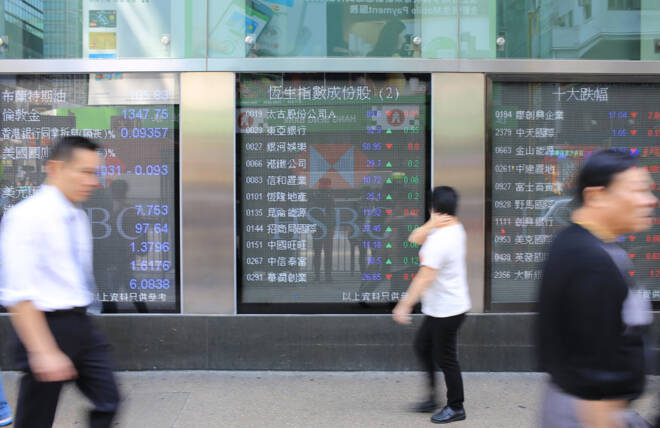Advertisement
Advertisement
Hang Seng Index Gains on AI Rally, While Nikkei and ASX 200 Face Tariff Headwinds
By:
Key Points:
- China’s annual inflation rose to 0.5% in January, easing deflation fears and boosting Hang Seng Index by 1.21%.
- Nikkei 225 dipped 0.10% as Japan’s wage growth fueled bets on a BoJ rate hike, pressuring equities and boosting the yen.
- ASX 200 tracked Wall Street lower, sliding 0.30%, as tariff risks hit mining and tech stocks.
US Markets Slide on Tariff Developments and Inflation Jitters
On Friday, February 7, US equity markets hit the reverse as traders reacted to US economic data and escalating trade tensions. The Nasdaq Composite Index dropped by 1.36%, while the Dow and S&P 500 posted losses of 0.99% and 0.95%, respectively.
Market sentiment waned after US President Trump warned of reciprocal tariffs, fueling fears of an escalation in the US-China trade war. Sweeping tariffs could push import prices higher, intensifying inflationary pressures. Higher inflation may delay Fed rate cuts, raising borrowing costs and potentially impacting company earnings.
US Economic Data Signals Hawkish Fed Rate Path
US economic indicators also influenced risk sentiment. Nonfarm payrolls and US consumer sentiment fell short of expectations. However, a lower unemployment rate and rising inflation expectations sank expectations for an H1 2025 Fed rate cut.
The US unemployment rate dropped from 4.1% in December to 4.0% in January, while the Michigan Inflation Expectations Index surged to 4.3% in February, up from 3.3% in January.
Tighter labor market conditions may bolster wage growth and consumer spending, fueling demand-driven inflation. A higher inflation outlook could bring forward consumer spending plans, adding further upward pressure on inflation.
China Inflation Accelerates, Signaling Stronger Domestic Demand
On Sunday, February 9, China’s inflation numbers set the tone for the Hong Kong and Mainland China markets. The annual inflation rate rose to 0.5% in January, up from 0.1% in December. The upswing in consumer prices suggested a pickup in domestic demand, potentially fueled by recent stimulus measures.
East Asia Econ, a research service, dismissed the possibility that the Chinese New Year skewed the data, stating:
China – core CPI back up to +2%. January core CPI picked up. That doesn’t look like a Chinese New Year effect, and comes after Q4 when prices were already looking firmer. This doesn’t mean inflation, but if core, which has underperformed other price indicators, is now catching up, it would mean China isn’t in underlying deflation.”
Easing deflationary pressures countered investor concerns about US-China trade tensions.
Hang Seng Index Gains as AI Stocks Rally
Turning to the Asian equity markets, the Hang Seng Index advanced by 1.21% in Monday morning’s session. Sentiment toward China’s competitiveness in the global AI race continued driving demand for tech stocks.
The Hang Seng Technology Index rallied 1.52%, with Alibaba (9988) and Biadu (9888) soaring 4.20% and 3.42%, respectively. Brian Tycangco, editor and analyst at Stansberry Research, recently identified Baidu as a key player in China’s tech and AI space.
Meanwhile, it was a mixed start to the week for China’s Mainland equity markets amid tariff uncertainty. The CSI 300 edged 0.01% lower, while the Shanghai Composite Index gained 0.34%.
Nikkei Index Falls as BoJ Rate Hike Looms
Japan’s Nikkei Index dropped by 0.10% on Monday morning. Tariff developments and BoJ policy sentiment impacted buyer demand for Japanese stocks.
The USD/JPY pair hovered below 152 after last week’s retreat. Japan’s recent wage growth figures boosted bets on a Bank of Japan rate hike, sending the USD/JPY pair tumbling 2.43% in the week ending February 7. A stronger Japanese Yen could weigh on overseas earnings and company valuations.
Among notable movers, Nissan Motor Corp. (7201) and Softbank Group (9984) declined 1.14% and 2.01%, respectively.
ASX 200 Tracks Wall Street Lower
Australia’s ASX 200 Index declined by 0.30% on Monday morning, tracking Friday’s losses on Wall Street.
Mining and tech stocks weighed as tariff developments dragged down major players. BHP Group Ltd (BHP) and Rio Tinto Ltd. (RIO) slid by 1.15% and 1.05%, respectively, while the S&P/ASX All Technology Index dropped 0.82%.
Outlook: Risks and Opportunities Ahead
Looking ahead, geopolitical tensions, US-China tariff developments, and the global AI race remain the key market drivers. AI stocks may continue extending their gains as competition intensifies. However, trade-sensitive sectors such as manufacturing and mining could experience further volatility.
Progress in US-China trade negotiations could benefit Australian, Hong Kong, and Mainland China’s markets. The Hang Seng Index may extend gains on AI sector momentum. However, Asian markets remain exposed to trade war escalations.
Discover strategies to navigate this week’s market trends here.
About the Author
Bob Masonauthor
With over 28 years of experience in the financial industry, Bob has worked with various global rating agencies and multinational banks. Currently he is covering currencies, commodities, alternative asset classes and global equities, focusing mostly on European and Asian markets.
Advertisement
